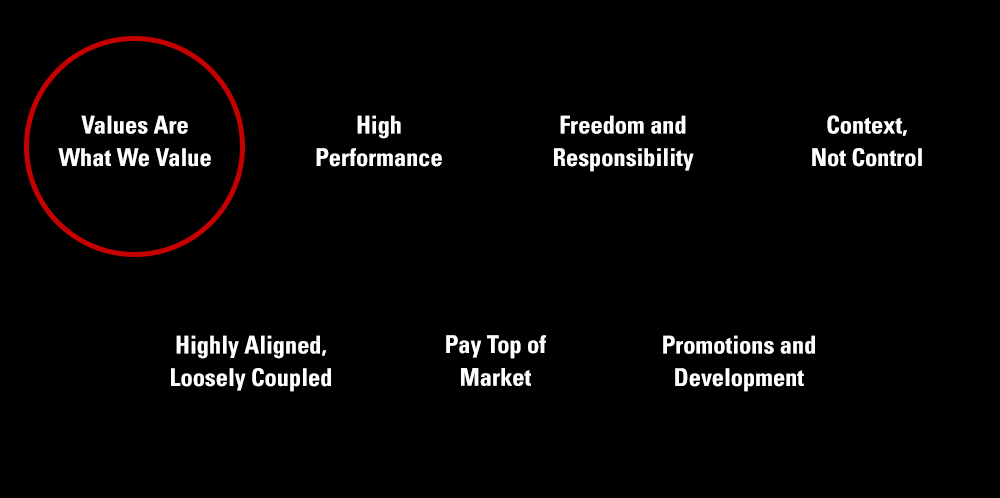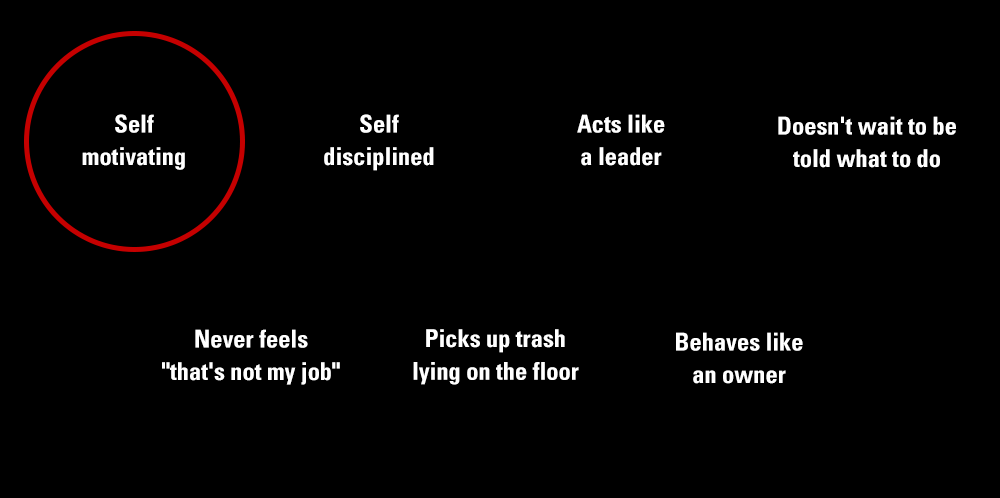What gives Netflix the best chance of continuous success for many generations of technology and people?
Below are the seven aspects of our culture

WE PARTICULARLY VALUE IN OUR COLLEAGUES THESE NINE BEHAVIORS
AND SKILLS.
Judgment
You make wise decisions (people, technical, business, and creative) despite ambiguity.
You identify root causes, and get beyond treating symptoms. You think strategically, and can articulate what you are, and are not, trying to do. You smartly separate what must be done well now, and what can be improved later.
Communication
You listen well, instead of reacting fast, so you can better understand. You are concise and articulate in speech and writing. You treat people with respect independent of their status or disagreement with you. You maintain calm poise in stressful situations.
Impact
You accomplish amazing amounts of important work. You demonstrate consistently strong performance so colleagues can rely upon you. You focus on great results rather than on process. You exhibit bias-to-action, and avoid analysis-paralysis.
Curiosity
You learn rapidly and eagerly. You seek to understand our strategy, market, subscribers, and suppliers. You are broadly knowledgeable about business, technology and entertainment. You contribute effectively outside of your speciality.
Innovation
You re-conceptualize issues to discover practical solutions to hard problems. You challenge prevailing assumptions when warranted, and suggest better approaches. You create new ideas that prove useful. You keep us nimble by minimizing complexity and finding time to simplify.
Courage
You say what you think even if it is controversial. You make though decisions without excessive agonizing. You take smart risks. You question actions inconsistent with our values.
Passion
You inspire others with your thirst for excellence. You care intensely about Netflix' success. You celebrate wins. You are tenacious.
Imagine if every person at Netflix is someone you respect and learn from.
Great workplace is stunning colleagues.
Great workplace is not day-care, espresso, health benefits, sushi lunches, nice offices, or big compensation, and we only do those that are efficient at attracting stunning colleagues.
Like every company, we try to hire well.
But, unlike many companies, we practice "adequate performance gets a generous severance package."
We're a team,
not a family.
We're like a pro sports team, not a kid's recreational team.
Coaches' job at every level of Netflix to hire, develop and cut smartly, so we have starts in every position.
HONESTY ALWAYS.
To avoid surprises, you should periodically ask your manager:
Loyalty is good.
- Loyalty is good as a stabilizer
- People who have been stars for us, and hit a bad patch, get a near term pass because we think they are likely to become stars for us again
- We want the same: if Netflix hits a temporary bad patch, we want people to stick with us
- But unlimited loyalty to a shrinking firm, or to an ineffective employee, is not what we are about
Hard work — not directly relevant.
- It's about effectiveness — not effort — even though effectiveness is harder to assess than effort
- We don't measure people by how many evenings or weekends they are in their cube
- We do try to measure people by how much, how quickly and how well they get work done — especially under deadline
Brilliant jerks.
- Some companies tolerate them
- For us, the cost to teamwork is too high
- Diverse styles are fine — as long as person embodies the 9 values
Why are we so manic on
high performance?
In procedural work, the best are 2x better than the average. In creative work, the best are 10x better than the average, so huge premium on creating effective teams of the best. Great workplace is stunning colleagues.
THE RARE RESPONSIBLE PERSON.

Responsible people thrive on freedom and are worthy of freedom.
Our model is to increase employee freedom as we grow, rather than limit it, to continue to attract and nourish innovative people, so we have better chance of long-term continued success.
"Good" vs "Bad" Processes
"Good" processes help talented people get more done:
| "Bad" processes try to prevent recoverable mistakes:
|
Rule Creep
"Bad" processes tend to creep in (preventing errors just sounds so good).
We try to get rid of rules when we can, to reinforce the point.
Example: Netflix Vacation Policy
and Tracking
Until 2004 we had the standard model of N days per year:
Meanwhile...
We're all working online some nights and weekends, responding to emails at odd hours, and taking an afternoon now and then for personal time.
An employee pointed out...
We don't track hours worked per day or per week,
so why are we tracking days of vacation per year?
"Act in Netflix's Best Interests "
generally means...
|
|
|
|
FREEDOM AND RESPONSIBILITY.
- Many people say one can't do it at scale
- But since going public in 2002, which is traditionally the beginning of the end for freedom, we've increased talent density and employee freedom substantially.
Summary of Freedom & Responsibility
- As we grow, minimize rules
- Inhibit chaos with ever more high performance people
- Flexibility is more important than efficiency in the long term
"If you want to build a ship, don't drum up the people to gather wood, divide the work and give orders. Instead, teach them to yearn for the vast and endless sea."
– Antoine De Saint-Exupery, Author of The Little Prince
The best managers figure out how to get great outcomes by setting the appropriate context, rather than by trying to control their people.
Managers:Instead, ask yourself what context you failed to set. | Managers:Are you articulate and inspiring enough about goals and strategies? |
No Fixed Budgets
There are no centrally administered "raise pools" each year. Instead, each manager aligns their people to market each year — the market will be different in different areas.
Annual Comp Review
Some people will move up in comp very quickly because their value in the marketplace is moving up quickly, driven by increasing skills and/or great demand for their area.
Some people will move down or stay flat because their value in the marketplace has moved down or stayed flat. Depends in part on inflation and economy. Still top of market, though, for that person.
Compensation Not Dependent
on Netflix Success
Whether Netflix is prospering or floundering, we pay at the top of the market
- i.e., sports teams with losing records still pay talent the market rate.
Employees can choose how much they want to link their economic destiny to Netflix success or failure by deciding how much Netflix stock or stock options they want to own.
Employee Success
It's pretty ingrained in our society that the size of one's raise is the indicator of how well one did the prior year — but at Netflix there are other factors too — namely, the outside market.
In our model, employee success is big factor in comp because it influences market value:
- In particular, how much we would pay to keep the person
- But employee success is not the only factor in comp, so the linkage of prior year performance to raise size is weak
Good For Each Employee to
Understand Their Market Value
- It a healthy idea, not a traitorous idea, to understand what other firms would pay you, by interviewing and talking to peers at other companies
- Talk with your manager about what you find
- Minor exception: Interviewing with groups that directly compete with Netflix, because their motive is in part confidential information
Efficiency
Big salary is the most efficient form of comp:
|
|
Optional Options
- Employees can request to trade salary for stock options, if they wish
- The options are fully vested, granted monthly, and cost employees in preâ€tax salary approximately half of what such an option would cost in the open market
- Options ultimately valuable only if Netflix stock climbs over the next 10 years
- Investing in Netflix stock or stock options lets one participate in Netflix success or failure at whatever level is comfortable for employee
In some time periods, in some groups, there will be lots of opportunity and growth at Netflix.
Some people, through both luck and talent, will have extraordinary career growth.
NETFLIX DOESN'T HAVE TO BE FOR LIFE.
- In some times, in some groups, there may not be enough growth opportunity for everyone
- In which case we should celebrate someone leaving for a bigger job that we didn't have available to offer them
- If that is what the person prefers
Two Necessary Conditions for Promotion
Job has to be big enough
- We might have an incredible manager of something, but we don't need a director of it because job isn't big enough
- If the incredible manager left, we would replace with manager, not with director
Person has to be a superstar in current role
- Could get the next level job here if applying from outside and we knew their talents well
- Could get the next level job at peer firm that knew their talents well
Timing
- If manager would promote employee to keep them if employee were thinking of leaving, manager should promote now, and not wait
- Both tests still have to be passed
- Job big enough
- Superstar in current role
Development
- We develop people by giving them the opportunity to develop themselves, by surrounding them with stunning colleagues and giving them big challenges to work on
- Mediocre colleagues or unchallenging work is what kills progress of a person's skills - Formalized development is rarely effective, and we don't try to do it
- E.g. Courses, mentor assignment, rota<on around a firm, multi-year career paths, etc. - High performance people are generally self improving through experience, observation, introspection, reading and discussion
- As long as they have stunning colleagues and big challenges
Why is culture important?
What is our culture trying to support?
Culture is how a firm operates What practices give Netflix the best chance of continuous success for many generations of technology and people? Continuous Success = Continuous growth in revenue, profits & reputation
Need a culture that supports rapid
innovation and excellent execution
Both are required for continuous growth.
There is tension between these two goals; between creativity and discipline.
Need a culture that supports effective teamwork
of high-performance people
High performance people and effective teamwork can be in tension also —
stars have strong opinions.
